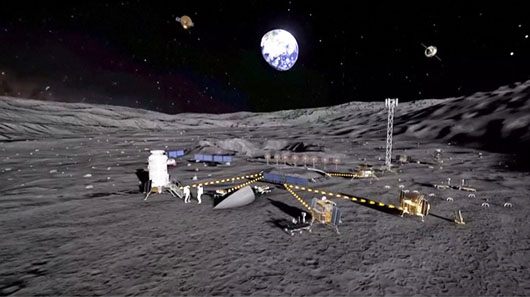Special to CosmicTribune.com, September 17, 2025
By Richard Fisher
China and Russia are pushing ahead with complimentary, perhaps competitive global space alliance structures that leverage their respective investments in proto-alliances, like the 2001 Shanghai Cooperation Organization (SCO) and the 2009 Brazil, Russia, India, China, South Africa (BRICS) organization.

Though it began in 2021 as a China-Russia partnership, the International Lunar Research Station (ILRS) is now dominated by China and claims 13 member states: China; Russia; Azerbaijan; Belarus; Egypt; Nicaragua; Serbia; Pakistan; South Africa; Thailand; Venezuela; Kazakhstan; and Senegal.
China clearly wants to increase ILRS membership; In an Aug. 27, 2025 China Daily article, “Lunar station mission possible with global cooperation,” China Deep Space Exploration Laboratory (DSEL) researcher Ren Xiaoqiang was quoted saying:
“Over the next decade, China aims to seek cooperation with 50 countries or organizations, 500 research institutions and 5,000 scientists from across the world to join the ILRS as partners in this global project.”
Furthermore, he stated, “To promote international cooperation on the ILRS, China plans to establish an international cooperation committee, build an international cooperation headquarters with partner countries and actively create favorable conditions for the international partners.”
So, China intends to give the ILRS a physical presence in a headquarters building, meaning it will also be paying for a large number of member state officials to work in said headquarters, which will produce payoffs when they return to their respective countries to make space political-security and procurement decisions that favor China.
However, it appears now that China hopes to leverage its dominance of the Shanghai Cooperation Organization to advance its membership goals for the ILRS.
In his Sept. 1 speech before the recent SCO summit in Tianjin, China, Chinese Communist Party leader Xi Jinping stated, “We welcome all parties to use the Beidou Satellite Navigation System and invite countries with relevant capacities to take part in the International Lunar Research Station project.”
The SCO currently has ten member states, two “observers” or pre-members and 17 “partners,” the first step toward full membership.
Current SCO-ILRS overlap includes China; Russia; Azerbaijan; Belarus; Pakistan; and Kazakhstan, but China has invited significant space power and SCO member India to join the ILRS, and economically powerful SCO “partners” with an interest in space include Saudi Arabia, the United Arab Emirates and Kuwait.
But in seeming competition, Russia appears to be seeking to leverage what it may regard as a strong leadership position in the now ten-member BRICS organization, which exists only to the extent that China does not seek to achieve dominance (likely also to be resisted by India), to form a new space alliance that it hopes to dominate.
Full Text . . . . Current Edition . . . . Subscription Information

You must be logged in to post a comment Login